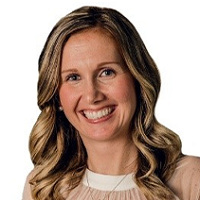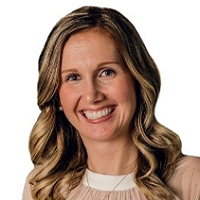Bigger Isn't Always Better When It Comes to Financial Advice
Here's why a smaller, independent adviser could be a better fit for your retirement-planning needs than the big-name institutions.


Profit and prosper with the best of Kiplinger's advice on investing, taxes, retirement, personal finance and much more. Delivered daily. Enter your email in the box and click Sign Me Up.
You are now subscribed
Your newsletter sign-up was successful
Want to add more newsletters?

Delivered daily
Kiplinger Today
Profit and prosper with the best of Kiplinger's advice on investing, taxes, retirement, personal finance and much more delivered daily. Smart money moves start here.

Sent five days a week
Kiplinger A Step Ahead
Get practical help to make better financial decisions in your everyday life, from spending to savings on top deals.

Delivered daily
Kiplinger Closing Bell
Get today's biggest financial and investing headlines delivered to your inbox every day the U.S. stock market is open.

Sent twice a week
Kiplinger Adviser Intel
Financial pros across the country share best practices and fresh tactics to preserve and grow your wealth.

Delivered weekly
Kiplinger Tax Tips
Trim your federal and state tax bills with practical tax-planning and tax-cutting strategies.

Sent twice a week
Kiplinger Retirement Tips
Your twice-a-week guide to planning and enjoying a financially secure and richly rewarding retirement

Sent bimonthly.
Kiplinger Adviser Angle
Insights for advisers, wealth managers and other financial professionals.

Sent twice a week
Kiplinger Investing Weekly
Your twice-a-week roundup of promising stocks, funds, companies and industries you should consider, ones you should avoid, and why.

Sent weekly for six weeks
Kiplinger Invest for Retirement
Your step-by-step six-part series on how to invest for retirement, from devising a successful strategy to exactly which investments to choose.
For an individual investor, finding the right financial professional can be a challenge.
To start with, there’s the bewildering array of titles, including broker, adviser, planner, manager and even coach.
And then there’s all those letters (RIA, CFP, CFA and so on) and numbers (Series 6, 7, 65 and 66) that represent certifications and licenses.
From just $107.88 $24.99 for Kiplinger Personal Finance
Become a smarter, better informed investor. Subscribe from just $107.88 $24.99, plus get up to 4 Special Issues

Sign up for Kiplinger’s Free Newsletters
Profit and prosper with the best of expert advice on investing, taxes, retirement, personal finance and more - straight to your e-mail.
Profit and prosper with the best of expert advice - straight to your e-mail.
By the time they get to the method of compensation (fee-only, fee-based or commission) and the fiduciary vs. suitability discussion, the majority of the people I meet have no idea what it all means. It’s no wonder so many simply opt for the brand-name brokerage they see on TV instead of the small independent adviser who might be the better choice.
But when you go with Wall Street instead of Main Street, you lose a few things:
Unfortunately, we’re kind of stuck in this David vs. Goliath mode in the financial industry, where the average person on the street doesn’t even know there are different levels of advice and attention.
A lot of that is marketing. All those radio and TV commercials, the golf tournament sponsorships and stadium-naming rights build a brand and get the word out in a way that an independent adviser can’t afford.
But when it comes to minding your portfolio and your plan, bigger isn’t always better.
Do your homework. Research online. Ask friends and colleagues if they have an adviser they like. Attend seminars. Don’t hesitate to quiz people about compensation. And interview multiple advisers until you find one that’s a good fit for you.
Kim Franke-Folstad contributed to this article.
Securities offered only by duly registered individuals through Madison Avenue Securities, LLC (MAS), Member FINRA & SIPC. Advisory services offered only by duly registered individuals through Brighter Financial Capital Management, LLC, a SEC Investment Advisor. Insurance products and services are offered through Clark & Associates, Inc. Financial Solutions, an affiliated company. Brighter Financial Capital Management, LLC and MAS are separate entities, independently owned.
The appearances in Kiplinger were obtained through a PR program. The columnist received assistance from a public relations firm in preparing this piece for submission to Kiplinger.com. Kiplinger was not compensated in any way.
Megan Clark is not affiliated with, or endorsed by Kiplinger.com.
Related Content
- This Is What Good Financial Planners Do
- A Financial Professional Can Help You Avoid Retirement Blind Spots
- Take Biases and Backgrounds into Account When Seeking a Financial Adviser
Profit and prosper with the best of Kiplinger's advice on investing, taxes, retirement, personal finance and much more. Delivered daily. Enter your email in the box and click Sign Me Up.

Megan Clark is CEO and executive wealth manager at Clark & Associates Inc. Financial Solutions and is an Investment Adviser Representative, an insurance professional and a Retirement Income Certified Professional®. As a financial adviser, she is passionate about helping families create a holistic financial plan, and she often holds "For Women by Women" informational seminars to reach out to and assist women in pursuing their goals. Clark has been recognized for several achievements, including Forbes Best-In-State Next-Gen Wealth Advisors 2019 and America's Top Women Advisors 2020.
-
 When Estate Plans Don't Include Tax Plans, All Bets Are Off
When Estate Plans Don't Include Tax Plans, All Bets Are OffEstate plans aren't as effective as they can be if tax plans are considered separately. Here's what you stand to gain when the two strategies are aligned.
-
 Relying on Real Estate in Retirement? Avoid These 3 Mistakes
Relying on Real Estate in Retirement? Avoid These 3 MistakesThe keys to successful real estate planning for retirees: Stop thinking of property income as a reliable paycheck, start planning for tax consequences and structure your assets early to maintain flexibility.
-
 These Small Money Habits Really Can Plant Roots
These Small Money Habits Really Can Plant RootsFebruary gets a bad rap for being the month when resolutions fade — in fact, it's the perfect time to reset and focus on small changes that actually pay off.
-
 When Estate Plans Don't Include Tax Plans, All Bets Are Off: 2 Financial Advisers Explain Why
When Estate Plans Don't Include Tax Plans, All Bets Are Off: 2 Financial Advisers Explain WhyEstate plans aren't as effective as they can be if tax plans are considered separately. Here's what you stand to gain when the two strategies are aligned.
-
 Counting on Real Estate to Fund Your Retirement? Avoid These 3 Costly Mistakes
Counting on Real Estate to Fund Your Retirement? Avoid These 3 Costly MistakesThe keys to successful real estate planning for retirees: Stop thinking of property income as a reliable paycheck, start planning for tax consequences and structure your assets early to maintain flexibility.
-
 I'm a Financial Planner: These Small Money Habits Stick (and Now Is the Perfect Time to Adopt Them)
I'm a Financial Planner: These Small Money Habits Stick (and Now Is the Perfect Time to Adopt Them)February gets a bad rap for being the month when resolutions fade — in fact, it's the perfect time to reset and focus on small changes that actually pay off.
-
 Social Security Break-Even Math Is Helpful, But Don't Let It Dictate When You'll File
Social Security Break-Even Math Is Helpful, But Don't Let It Dictate When You'll FileYour Social Security break-even age tells you how long you'd need to live for delaying to pay off, but shouldn't be the sole basis for deciding when to claim.
-
 I'm an Opportunity Zone Pro: This Is How to Deliver Roth-Like Tax-Free Growth (Without Contribution Limits)
I'm an Opportunity Zone Pro: This Is How to Deliver Roth-Like Tax-Free Growth (Without Contribution Limits)Investors who combine Roth IRAs, the gold standard of tax-free savings, with qualified opportunity funds could enjoy decades of tax-free growth.
-
 One of the Most Powerful Wealth-Building Moves a Woman Can Make: A Midcareer Pivot
One of the Most Powerful Wealth-Building Moves a Woman Can Make: A Midcareer PivotIf it feels like you can't sustain what you're doing for the next 20 years, it's time for an honest look at what's draining you and what energizes you.
-
 I'm a Wealth Adviser Obsessed With Mahjong: Here Are 8 Ways It Can Teach Us How to Manage Our Money
I'm a Wealth Adviser Obsessed With Mahjong: Here Are 8 Ways It Can Teach Us How to Manage Our MoneyThis increasingly popular Chinese game can teach us not only how to help manage our money but also how important it is to connect with other people.
-
 Looking for a Financial Book That Won't Put Your Young Adult to Sleep? This One Makes 'Cents'
Looking for a Financial Book That Won't Put Your Young Adult to Sleep? This One Makes 'Cents'"Wealth Your Way" by Cosmo DeStefano offers a highly accessible guide for young adults and their parents on building wealth through simple, consistent habits.